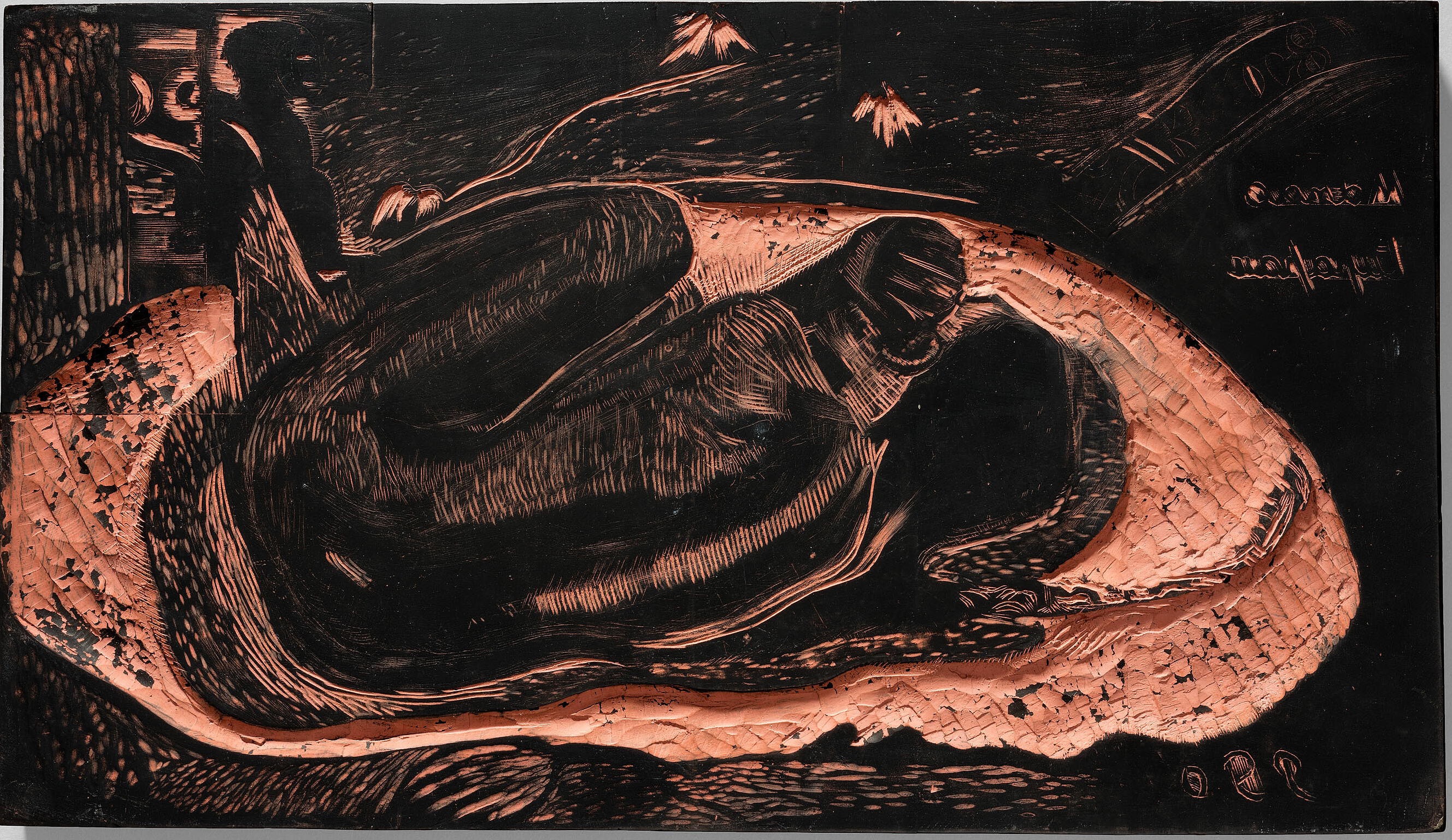PerfectEnding

Paul Gauguin: Manao tupapau:
(She Thinks of the Ghost or The Ghost Thinks of Her),
from the Noa Noa Suite (1893/94)
"I'm not quite finished yet."
©2022 by David A. Schmaltz - all rights reserved
To speak of a PerfectEnding might be to speak heresy, for the orthodoxy does not usually believe in such things. For them, endings bring opportunities for analysis, for determining what went wrong, to identify root causes, and to inflict judgement, all for the purpose of pursuing the ultimate unachievable objective: continuous improvement. Without such operations, orthodoxies would very quickly go out of business, for without the need for imposing salvation, it's whole operation seems simply fraudulent. If improvement isn't warranted, what's a higher power supposed to do? Could it thrive living in parity with its laity?
In SetTheory, such traditional hierarchies do not hold sway, for they become just another basis for conducting analysis intended to make sense of their presence. What service might they perform? What good? What harm? They become 'just' another element imbedded within another infinite swirl, another infinite swirl within another infinite swirl ad infinitum, without obvious ending or beginning, infinite multi-dimensional continuums. The question always reduces to how we might make sense, or better sense, or different sense of this. Where might we choose to place this phenomenon within the firmament and what sense might we choose to make of it and its placement? Notice how we're not really trying to definitively define. Our analysis might not settle anything, but spark even more questions without definitive answers, ones aching for our attention if not for our judgement. Who would we have to become to judge such exquisite orders? Better for us and for our universe, perhaps, to merely appreciate the unfolding orders as they appear, each perhaps holding its own already PerfectEnding.
I believe that some benevolent god created language, or at least English, with one notable exception. The devil most certainly created 'is,' for 'is' seems the disrupter spoiling this dream. Once we became obsessed with nailing down 'is,' we'd abandoned the garden, the infinite paradise where everything could thrive if only left adequately undefined. In paradise, things only exist in relationship—some insist divine relationship—with others. No anything can ever stand isolated. 'Is' serves as the isolation chamber. It ignores the essentially infinite nature of every so-called being and element to insist that each be reduced into its definite. The resulting definites only qualify as definite delusions, for they exist only as impossible fictions, irreducible, uninteresting, isolated, lonely. The resulting Hell seems only a tragic case where the currency calculates the cost of everything and the value of nothing at all, especially not inevitably perfect endings.
SetTheory acknowledges the inherent ambiguity of terms like Perfect. The obvious fact that in relation, Perfect does not hold a finite definition does not bother SetTheory for a second, for it came prepared for this experience and easily adds my PerfectEnding into the set of everything Perfect, a modestly-sized infinite. That Perfect holds an infinite definition should not worry anyone, for our purpose is never to get to the bottom of our inquiry, but to more fully immerse ourselves within it. How delightful I find it, to be suddenly suspended within the Perfect infinity, one in no need of root cause analysis or infinite improvement. Ending, likewise, hangs within another modestly-sized infinity which holds the ambiguity of Ending, which has never once in the history of this universe so far ever held its own distinct spot. There never was a stake hammered into any ground labeled 'Here lies Ending.' Not even Endings end up as definites.
So here I sit, at the confluence of two mostly-sized infinites, seeking meaning, seeking insight, trying to communicate my experience to my readers. I imagine them wondering what David supposes he means when he labels todays story, not even the final SetTheory Story, PerfectEnding? Knowing David as we do, he might be meaning the opposite of what he seems to be saying, maybe he's employing irony to imply other than perfect and other than ending. What must he be saying? Thorough analysis might conclude that he's saying whatever any of his readers presumes he's saying, producing a more modest-sized infinity from which to derive meaning. If the analyst presumes this meaning-making system must reduce to a single definite meaning, he presumes away any possibility of ever understanding the nature of this meaning-making system. The purpose of PerfectEnding might have necessarily begun ambiguous and might well never progress beyond this state, it apparently being its natural one, just another modest-sized infinite wanting acceptance.
Perfect was never a point. Ending never finished. I'd intended these SetTheory Stories to imperfectly describe my Manner of Being, not to catalogue my achieving anything. Toward that ending, an acknowledged small infinite target, the stories themselves were not instructions. I never did discover how to produce that SetList and perform it. I merely managed to produce that SetList and perform it without ever knowing how. I relied upon my Manner of Being to inform my actions. My Manner of Being employs sets, intersections of infinites, to derive meanings and purposes, most of which remain mostly in infinite states even as I attempt to derive something approaching finite meanings and purposes. As my stories might have successfully demonstrated, I almost never succeeded in nailing down my pursuit. I just managed to succeed anyway, without once successfully identifying root causes or engaging in infinitely continuous improvement to produce something gratefully less than a PerfectEnding. I co-opted that whole process using SetTheory to grapple with intersecting infinities and deriving enough meaning to produce another in a likely infinite series of PerfectEndings. Pity me, I invite you with a glint of real irony in my infinite eye.
I'm not quite finished yet.


